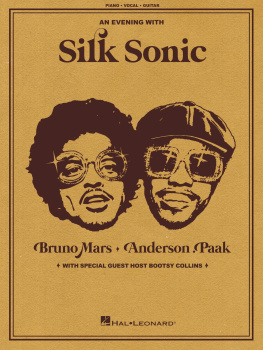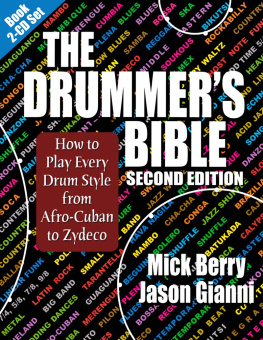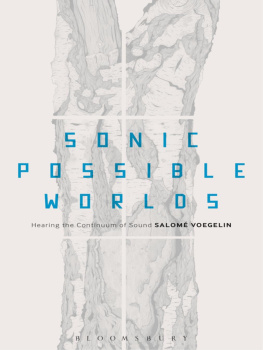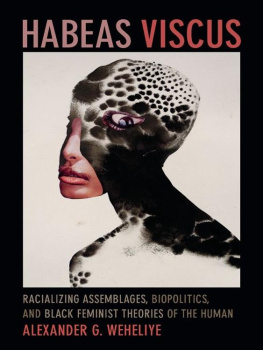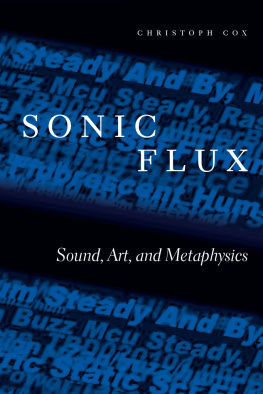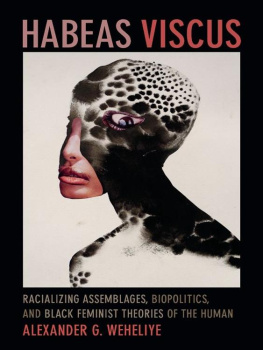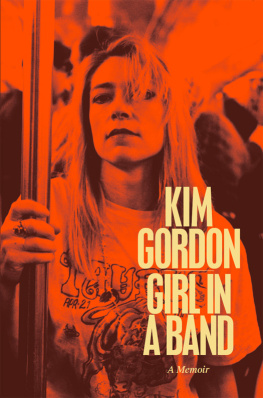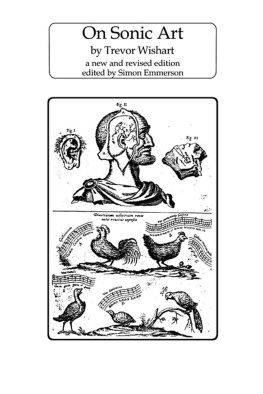Weheliye - Phonographies: Grooves in Sonic Afro-Modernity
Here you can read online Weheliye - Phonographies: Grooves in Sonic Afro-Modernity full text of the book (entire story) in english for free. Download pdf and epub, get meaning, cover and reviews about this ebook. year: 2005, genre: Romance novel. Description of the work, (preface) as well as reviews are available. Best literature library LitArk.com created for fans of good reading and offers a wide selection of genres:
Romance novel
Science fiction
Adventure
Detective
Science
History
Home and family
Prose
Art
Politics
Computer
Non-fiction
Religion
Business
Children
Humor
Choose a favorite category and find really read worthwhile books. Enjoy immersion in the world of imagination, feel the emotions of the characters or learn something new for yourself, make an fascinating discovery.

- Book:Phonographies: Grooves in Sonic Afro-Modernity
- Author:
- Genre:
- Year:2005
- Rating:4 / 5
- Favourites:Add to favourites
- Your mark:
- 80
- 1
- 2
- 3
- 4
- 5
Phonographies: Grooves in Sonic Afro-Modernity: summary, description and annotation
We offer to read an annotation, description, summary or preface (depends on what the author of the book "Phonographies: Grooves in Sonic Afro-Modernity" wrote himself). If you haven't found the necessary information about the book — write in the comments, we will try to find it.
Weheliye: author's other books
Who wrote Phonographies: Grooves in Sonic Afro-Modernity? Find out the surname, the name of the author of the book and a list of all author's works by series.
Phonographies: Grooves in Sonic Afro-Modernity — read online for free the complete book (whole text) full work
Below is the text of the book, divided by pages. System saving the place of the last page read, allows you to conveniently read the book "Phonographies: Grooves in Sonic Afro-Modernity" online for free, without having to search again every time where you left off. Put a bookmark, and you can go to the page where you finished reading at any time.
Font size:
Interval:
Bookmark:


Phonographies
Grooves in Sonic Afro-Modernity
Duke University Press
Durham and London
2005 Duke University Press
All rights reserved
Printed in the United States of
America on acid-free paper Designed by CH Westmoreland
Typeset in Minion with
Helvetica Neue display by Tseng
Information Systems, Inc.
Library of Congress Cataloging-in-Publication Data appear on the last printed page of this book.
[The Negro] is not a visitor in the West, but a citizen there, and American; as American as the Americans who despise him, the Americans who fear him, the Americans who love himthe Americans who became less than themselves, or rose to be greater than themselves by virtue of the fact that the challenge he represented was inescapable The time has come to realize that the interracial drama acted out on the American continent has not only created a new black man, it has created a new white man too.... This world is no longer
white, and it will never be white again.James Baldwin
Lifting up from the circles and grooves of a record can change the weather. From freezing to hot to cool.
Toni Morrison
Actively we have woven ourselves with the very warp and woof of this nation.W. E. B. Du Bois
Invisibility, let me explain, gives one a slightly different sense of time, youre never quite on the beat....In
stead of the swift and imperceptible flowing of time, you are aware of its nodes, those points where time stands still or from which it leaps ahead. And you slip into the breaks and look around.Ralph Ellison
I wanna wind your little phonograph, just to hear your little motor moan.Robert Johnson
Acknowledgments ix
Intro: Its Beginning to Feel Like ... 1
1 Hearing Sonic Afro-Modernity 19
2 I Am I Be: A Subject of Sonic Afro-Modernity 46
3 In the Mix 73
4 Consuming Sonic Technologies 106
5 Sounding Diasporic Citizenship 145
Outro: Thinking Sound/Sound Thinking (Slipping into the Breaks Remix) 199
Notes 211
Works Cited 257
Index 279
The genre rules that I am subject to here require a listing of 1 debts owed to various persons. However, given the stifling economization of so many aspects of life in late capitalism, I prefer to think of such contributions to life and work as aneconomic gifts. As I discuss in my book, the gift, as theorized by Du Bois and several others, functions as both an offering and a poison, and that is what these people have given me, by offering their thoughts, time, energy, and the like while at the same time poisoning my thought. They have become voices, apparitions, images, smells, sounds, and so on in my body and mind, enabling me to think and live above, below, beyond, and beside that possessive pronoun my, and for that I am forever grateful.
Let me commence by thanking a group of intellectuals whose work has sustained me: Stuart Hall, Hortense Spillers, Gayatri Spivak, and Sylvia Wynter. In the years that I have spent thinking about and writing this book, these thinkers, individually and as a group, offered me a vital model for intellectual inquiry. I have also greatly benefited from various mentors and teachers, particularly Elke Stenzel and Ulla Haselstein, who provided challenges and support in high school and college, and Abena P. A. Busia, Bruce W. Robbins, and Cheryl A. Wall, who, as my graduate mentors offered me a mixture of critical acuity, generosity, understanding, and professional support. I can only hope to live up to the example they have set.
At Rutgers I had the good fortune of knowing and working with a group of dynamic graduate students and faculty members: Carol Allen, Deborah Allen, Anthony Alessandrini, Heather Russell Anderade, Kim Banks, Wesley Brown, Elaine Chang, Cheryl Clarke, Joseph Clarke, Sam Elworthy, Donald Gibson, Rachel Herzing, Briavel Holcomb, Myra Jehlen, Jonathan Kahana, Cora Kaplan and David Glover, John Kas-parian, Cindy Katz, Samira Kawash, Thomas Keck, Meredith McGill, Jennifer Milligan, Verner Mitchell, Tricia Rose, Julie Skemp, Neil Smith, Sarah Thompson, Michael Warner, and Maire Veith. I will always be immensely grateful for Craig Gilmore and Ruth Wilson Gilmores hospitality and intellectual generosity. During 1997-1998 I held a fellowship at the Rutgers Center for the Critical Analysis of Contemporary Culture; there the conversations were invaluable for formulating the beginnings of this project. The staff in the Rutgers English Department, Linda Kazusko, Nancy Miller, and Candace Walcott-Shepherd, offered endless help and a sense of humor. Tanya Agathocleous and Chris OBrien, Joseph Chaves, Erik Dussere and Stephanie Hartman, Lisa Gitelman, Helen Hurwitz, Lisa Lynch, and Tamar Rothenberg will hopefully continue to honor me with their friendship for years to come.
At the State University of New York, Stony Brook, Helen Cooper, E. Ann Kaplan, and (particularly) Ira Livingston welcomed and supported me in a difficult institutional situation, for which I am thankful. I was also fortunate enough to share conversations with numerous outstanding undergraduates at Rutgers, Stony Brook, and Northwestern; special thanks go to the students in my Sound/Technology/Culture classes, and particularly those in the Sonic Afro-modernity graduate class at Northwestern, for discussing much of the material in this project. Parts of the book have been published previously in the following venues: a much earlier version of chapter 3 appeared in American Studies/ Amerikastudien 45.4 (winter 2000), a shorter incarnation of chapter 2 can be found in the summer 2003 issue of boundary 2: an international journal of literature and culture, and a condensed version of chapter 3 appears in Public Culture 17.2 (spring 2005).
I am grateful also to many people at Northwestern and in Chicago: Jeffrey Masten, Bonnie Honig, Susannah Gottlieb, John Keene, Tricia Dailey, Carole Boyce Davies, Helmut Muller Sievers, Betsy Erkkila, Lynn Spigel, Reginald Gibbons, Sam Weber, Sandra Richards, Jay Grossman, Eric Sundquist, Elzbieta Foeller-Pituch, Miguel Vatter, Regina Schwartz, Tori Marlan, Mary Finn, Harry Samuels, and the members of the Northwestern Theory Reading Group. Particular thanks to Sharon Holland, Jennifer DeVere Brody, Kevin Bell, Dwight McBride, Dorothy Wang, E. Patrick Johnson, and Michael Hanchard for their collegiality and friendship. The staff in the Northwestern English and African American Studies departments provided smooth operations; many thanks to Kathy Daniels, Natasha Dennison, Marsha Figaro, Stacia Kozlowski, Nathan Mead, and Marilyn Williams. Jules Law and Jennifer Brody deserve special mention for being such exceptional mentors. A great deal of the final work on the manuscript was made possible by a generous fellowship from the Alice Berline Center for the Humanities at Northwestern.
Much gratitude goes to all those who read parts of manuscript and/or discussed its arguments with me at one point or another: Jonathan Arac, Kevin Bell, Lawrence Ytzak Brathwaite, Jennifer DeVere Brody, Joseph Chaves, Erik Dussere, Brian Edwards, Robert Gooding-Williams, Lisa Gitelman, Michael Hanchard, Kodwo Eshun, Ronald Judy, Andrea Klein-huber, Jules Law, Ira Livingston, Ruth Mayer, Charles Mudede, Alondra Nelson, Ulfried Reichardt, Ryan Snyder, and the readers at Duke University Press and the University of Minnesota Press. I thank Ken Wissoker for believing in this book as it currently stands and the staff of Duke University Press for their patience and expertise. A heap of gratitude goes to Sonia Nelson, who undertook the gargantuan task of proofreading an earlier incarnation of the whole manuscript, and Abigail Derecho, who compiled the index. Many thanks go out to Nadine Robinson for the permission to use her artwork and to Alondra Nelson for suggesting Robinsons work. I cannot do justice to the depths of Fred Motens engagement with the conceptual architecture of this book.
Font size:
Interval:
Bookmark:
Similar books «Phonographies: Grooves in Sonic Afro-Modernity»
Look at similar books to Phonographies: Grooves in Sonic Afro-Modernity. We have selected literature similar in name and meaning in the hope of providing readers with more options to find new, interesting, not yet read works.
Discussion, reviews of the book Phonographies: Grooves in Sonic Afro-Modernity and just readers' own opinions. Leave your comments, write what you think about the work, its meaning or the main characters. Specify what exactly you liked and what you didn't like, and why you think so.

